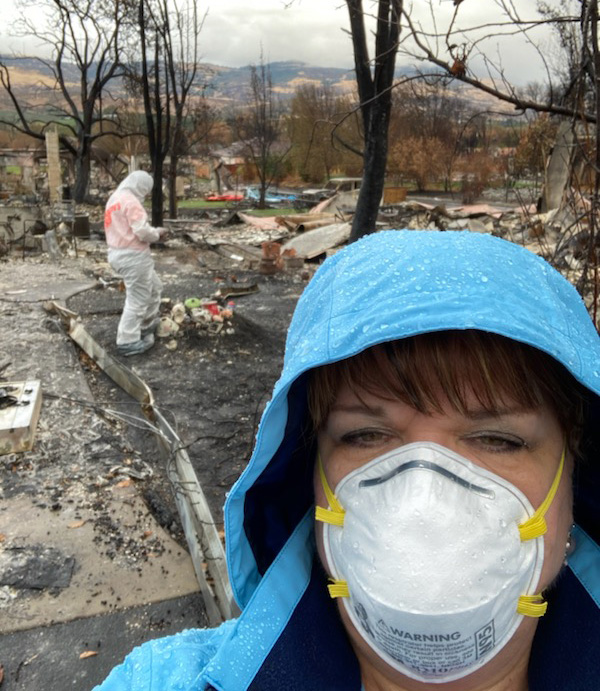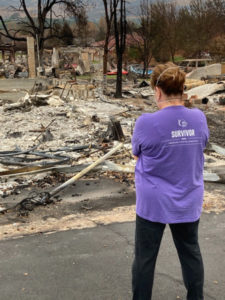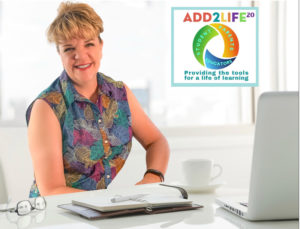COVID took her job, fires destroyed her town, but Kris Diasio carries on by helping students

On Sept. 8, 2020, Kris Diaso had concerns about her parents in a nearby town. Wildfires had raged across the west all summer and she had invited her parents to shelter at her condo after reports of fires in the area started.
She was reading when the power went out for a second time that day. She still didn’t think her home in the middle of town was at any risk. Then she saw black billowing smoke behind her fence in the backyard. The smoke clouds rapidly grew and Kris ran upstairs to pack some things. Police loudspeakers blared from the street, warning everyone to evacuate immediately.
Until that moment she hadn’t suspected she could be in danger at her idyllic home in Talent, Oregon.
A change of plans
After raising her daughter in the Bay Area, Kris had moved to southern Oregon to be closer to family a few years before the fire.
In March of 2020, Kris was employed as a Program Manager helping young victims of sex trafficking, a tough but rewarding job. But the company wanted her to continue to work in person, with COVID-19 spreading rapidly and no vaccine in sight. She refused and the company let her go.
Kris had worked with students and teens in various capacities for over 30 years. That summer, struggling with what to do next, she decided to return to self-employment as an educational coach. “It was time for another strategy. So I thought, why not build my business back up,” she explained. “I made a call to a former student who was doing extremely well in his own business. He had the tech savvy that I’d need to help to relaunch mine.”
Kris realized she could run her special education coaching business, called Add2Life20, online. That was ideal, as much of the country was in lockdown. She wanted to focus on helping students with ADHD and other learning challenges. Things started to look up, but nature had other plans.
Deadly wildfires
The day of the fire, the power had gone off several times. When she saw cars on her street in bumper-to bumper traffic she figured these were all people from nearby Ashland evacuating. She never considered they might be her neighbors fleeing from fire. But now clouds of thick smoke poured in and the urgent police loudspeakers meant the unthinkable had arrived.
Kris barely had time to grab a few precious scrapbooks and bags. She drove out through streets flanked by flames and blanketed with smoke. A nearby gas station exploded and was engulfed in flames. It looked, and felt, like a war zone.
That night she sheltered at her parents’ home, which had escaped danger. She didn’t learn until the next day that her home had burned to the ground.
In fact, most of Talent had burned in just hours. When Kris eventually returned to the site, the landscape was utterly unrecognizable. Metal objects had completely melted. Trees, furniture, fences, had all been reduced to thick layers of white ash.
Trauma brain
 “I was devastated,” Kris says. “No one, and I mean no one, can ever prepare you for a natural disaster.” The emotional impact of what happened to her unfolded over the following weeks.
“I was devastated,” Kris says. “No one, and I mean no one, can ever prepare you for a natural disaster.” The emotional impact of what happened to her unfolded over the following weeks.
Having worked with kids in crisis, Kris recognized how the disaster had affected her: “Talking about it now, I am speaking to the upper part of your brain, the pre-frontal cortex. When you are in trauma, you are in the cerebellum, the lower part of the brain. And good luck retaining information when you are there. In trauma brain, everything is upside down and inside out.”
Kris reflects on how she dealt with her own experience after working with sex-trafficked girls. “I would teach about trauma to my staff and would conduct monthly trainings. Now I was in trauma, but in a very different way than for the girls I worked with. But trauma is trauma.”
It took a while for Kris to come up for air. She kept busy on small tasks that she could handle. This was, after all, the exact skill she taught her students, so at base she knew HOW to do it, but navigating her own terrible experience felt different: “You’re in a different time zone than the rest of the world.”
Insurance headaches
Kris is extremely grateful for the outpouring of money, clothes and necessities that friends, family and strangers donated to her after she lost nearly everything. Navigating the insurance process, however, proved difficult.
“Yes, I had insurance,” Kris remembers, “but making an inventory of every single thing lost in the fire was overwhelming. My mother helped me for a time, but it was stressful for her as well.”
Working with the insurance company while still reeling from trauma was tough. “They expect you to recall where you purchased this item, how much that item cost and the year you purchased it.”
For those who haven’t faced the ordeal, she says, “you might think: ‘Oh no problem, I have pictures of everything on my phone.’ Nope. You still must write it all down. Insurance can’t tell from a photo if your couch is $800 or $8,000. My favorite part was when they asked for a serial number. I laughed at that. I asked my best friend to take over the rest. She’d work all day and then do my inventory at night.”
Healing through work
Kris focused on her fledging business and found that this helped her heal. She hired a visibility coach to help with navigating the networking site LinkedIn. Then she contacted a parent of one of her former students to help with promoting her content online.
“I joined a fantastic tribe of women on LinkedIn who were all entrepreneurs like me.” After that, Kris reached out to Koala, a Bay Area remote tutoring company, to build her virtual classroom specifically designed to serve both dyslexic and ADHD students.
“The most incredible thing was meeting the young men at Koala,” she says. “These men went the extra mile for me, have hosted me on a Podcast, and have supported me with one-on-one tutoring. I also took advantage of every single free webinar from both Koala and LinkedIn, I felt blessed with all the help I got while diving into my new-but-old career
Giving back

Kris is happy with the direction her business is taking. She didn’t have a lot of social media experience previously. “I am now on Google, YouTube, Linkedin, Facebook and Instagram,” she says. Now she can help students anywhere in the country. “I have always had the call to teach and it’s happening again now, but in a better way.”
She adds, “making a difference, especially after a VERY difficult year, is important to me. Plus I’ve now walked the mile myself, so I understand setbacks and struggle and adversity.”
In her new business, Kris coaches students who have learning challenges, helping them develop a plan and create a process to be successful. She also teaches organizational skills and time management, which with many students struggle. That struggle can get passed on to the parents.
“I come in and lift the burden off the parents. What I’ve learned in all of this is, you don’t have to go it alone. There is support out there, and I wouldn’t be where I am if it weren’t for all the support, kindness and love I received during the dark and heavy times.”
To learn more about Kris Diasio’s online student coaching program, visit her website at www.add2life20.com. She would also urge everyone reading this not to put off disaster preparations, even if you think it will never happen to you. For some ideas on how to prepare for disaster, click here. For help assembling an emergency “Go Bag” click here.
